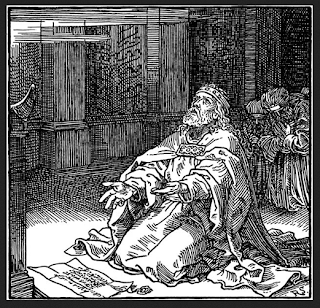TO CHEW ON: "Woe to him who strives with his Maker!
Let the potsherd strive with the potsherds of the earth!
Shall the clay say to him who forms it
'What are you making?'
Or shall your handiwork say, 'He has no hands'?" Isaiah 45:9
Included in today's amazing prophecy about Cyrus (the Persian king whom Isaiah predicted would free Israel from captivity 100 years before it happened) is a warning. It begins "Woe to him..." signalling that all who find themselves described in the words should pay attention. It answers the person who would take exception to God's method of using a heathen king to accomplish His work.
The warning pictures a lump of clay complaining to the potter about the way it is being shaped. I like how the NLT translates it:
"What sorrow awaits those who argue with their Creator.
Does a clay pot argue with its Maker?
Does the clay dispute with the one who shapes it,
saying 'Stop, you're doing it wrong!'
Does the pot exclaim, 'How clumsy can you be'?"
Do we ever do this--find ourselves discontented with the way we were created physically, mentally, emotionally? Do we wish we were taller or more athletic? Smarter and more creative? More expressive, or less?
Accepting how God has made us is an aspect of belief or unbelief. Practicing contentment with our lot in life, including our physical appearance and the strengths and weaknesses with which we were born is part of the fabric of our confidence in God.
I love how the idea that God knew what He was doing when he intentionally created each one of us is echoed in Ephesians 2:10. Here it is in the Amplified:
"For we are God's [own] handiwork (His workmanship), recreated in Christ Jesus, [born anew] that we may do those good works which God predestined (planned beforehand) for us [taking paths which He prepared ahead of time], that we should walk in them [living the good life which He prearranged and made ready for us to live]."
How amazing to be His handiwork. [The NLT translates it "masterpiece." The Greek word for "handiwork" is poiema - get it—poem.] What an adventure to discover and then do those "good works which God prepared beforehand" and find those works a perfect fit for us because we were made just for them.
PRAYER: Dear God, I so readily question and talk back to you about the way I am and my apparent weaknesses and lacks. Help me to have the uttermost confidence in Your wisdom when forming me. Help me to find and do those "works" that are my destiny. Amen.
PSALM TO PRAY: Psalm 119:33-65
**********
Unless otherwise noted all Scripture quotations are taken from the New King James Version®. Copyright © 1982 by Thomas Nelson, Inc. Used by permission. All rights reserved.
Scripture quotations marked NLT are taken from the Holy Bible, New Living Translation, copyright © 1996, 2004, 2007 by Tyndale House Foundation. Used by permission of Tyndale House Publishers, Inc., Carol Stream, Illinois 60188. All rights reserved.
Scripture quotations marked Amplified are taken from the Amplified® Bible, Copyright © 1954, 1958, 1962, 1964, 1965, 1987 by The Lockman Foundation. Used by permission." (www.Lockman.org)



















